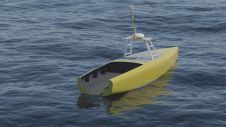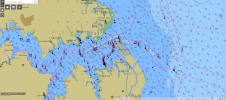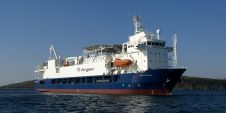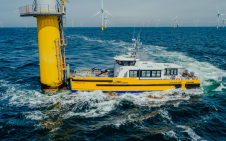We Visited for You
2nd International ECDIS Conference
A key objective of the 2nd International ECDIS Conference: ‘ECDIS Ð for Coastal and Ocean Navigation’, held in Singapore from 7th to 9th October, was to inform current and potential users of developments in the delivery of ECDIS. The three-day conference was co-organised by the Hydrographic Department of The Maritime and Port Authority of Singapore and the UKHO and attracted a wide range of delegates from thirty countries representing shipping companies, manufacturers, universities, training institutes and hydrographic offices.
After the opening preliminaries, the Conference began with an informative, albeit sobering, keynote address by Admiral Sir Nigel Essenhigh (former UK Hydrographer and later First Sea Lord) entitled ‘ECDIS: - Not Quite Yet’. The Admiral noted that at the first International ECDIS Conference in 1998 there had been considerable enthusiasm about the promise of ECDIS. However, five years later, it was his view that the implementation and uptake of ECDIS had not occurred as expected. His belief set a recurring theme for the Conference: an assessment of where things stood and what obstacles must be overcome to ensure the widespread use of ECDIS. At the same time, this was balanced by reports of exciting new developments for ECDIS, particularly in further applications for ENC data and the use of ECDIS technology on inshore waterways.
Impediments to Implementation
Various speakers gave their perspectives on what were the impediments and why they occurred. Some sensed a widespread misperception that ECDIS was simply a replacement for a paper chart, and this was a contributing factor. Others considered the decision by IMO not to make ECDIS a mandatory carriage requirement with a phased implementation time-table (as occurred with AIS and VDR), together with lack of uniformity between maritime nations (flag, coastal and port states) regarding electronic chart regulations were significant impediments to the widespread uptake and development of ECDIS. Also mentioned was the increasing use of cheaper, yet arguably equally sophisticated, ECS in ships rather than ECDIS. However, there was universal agreement that the main factor limiting ECDIS at present is the lack of world-wide ENC coverage and its availability. Even where ENC coverage exists, widespread confusion was reported from the user community regarding what is available, where it can be obtained, the wide variations in pricing and confusion over licensing and data security arrangements.
Positive Developments
Many encouraging developments were also reported. Considerable progress is being made regarding the development and widespread use of electronic chart navigation on rivers and inland waterways in Europe and North America. These developments are building upon the existing ECDIS and ENC technical specifications. Representatives from Navies and from commercial shipping, particularly the cruise industry, extolled the virtues of ECDIS and provided practical examples of the benefits. Other presenters demonstrated ENC data in hand-held PDAs, described ENC as a basis for GIS in coastal zone management as well as it providing a fundamental information layer in vessel monitoring and coastal surveillance.
The Way Forward
Without exception, all delegates present at the Conference made it very clear that they continue to believe in ECDIS and its potential to contribute to safer and more efficient navigation. However, there was an equally strong sense of frustration expressed by potential and actual users at the conference, who found it difficult to employ ECDIS as it was intended. The cause of these frustrations ranged from absence of a comprehensive global catalogue of ENC coverage, through difficulties in interpreting the regulatory requirements from country to country, to inconsistent application of the ENC standards being applied by individual HOs. As a result, the conference organisers agreed to conduct a further audit of the issues and to submit their findings to the IHO for the information of its Member States and other relevant organisations. As a result, this well-organised and conducted conference will hopefully lead to a renewed commitment by all the interested parties to get on with the task of ECDIS implementation.
Source: Dr Lee Alexander, Center for Coastal and Ocean Mapping, University of New Hampshire, USA, and CAPT Robert Ward, RAN, Australian Hydrographic Service, Australia

Value staying current with hydrography?
Stay on the map with our expertly curated newsletters.
We provide educational insights, industry updates, and inspiring stories from the world of hydrography to help you learn, grow, and navigate your field with confidence. Don't miss out - subscribe today and ensure you're always informed, educated, and inspired by the latest in hydrographic technology and research.
Choose your newsletter(s)
























